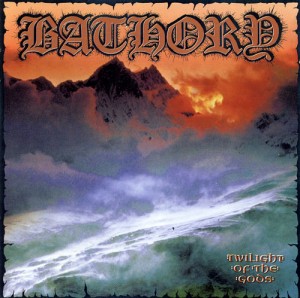BATHORY: TWILIGHT OF THE GODS (1991)
1) Twilight Of The Gods; 2)
Through Blood By Thunder; 3) Blood And Iron; 4) Under The Runes; 5) To Enter
Your Mountain; 6) Bond Of Blood; 7) Hammerheart.
This thematic follow-up to Hammerheart is even more epic and ambitious in nature than its predecessor
— starting out with the mere fact that it runs close to an hour, something that
was utterly unthinkable in Bathory's early speed metal days, and even Hammerheart itself stated its point in
about forty minutes. The subject matter stays the same (the album title could
not be more transparent), but the balloon has been inflated to the limit.
Lengthier, moodier intros; darker, ever more shadowy backing vocals; singalong
anthemic choruses; and, most importantly — this is probably the farthest that
Quorthon ever ventured away from stereotypical metal aesthetics. Formally,
this is still heavy metal («power metal», «Viking metal», whatever), but it
does not feel much like heavy metal —
more like a heavy rock opera with a dark folk basis.
There is nothing wrong in this per se, of
course, but one big reason why Hammerheart
worked so well were its undoubtedly metallic, undoubtedly killer riffs —
outbalancing and justifying the relatively shallow pathos. It may or may not
have given us a distinct musical vision of pre-Christian Scandinavia, but at
least it was a true blood-boiler. Twilight
Of The Gods, in comparison, places far more faith in atmospherics — slow,
leaden, repetitive, epic monsters, progressing in a regime stuck between stoner
rock and snail rock. There is some sense of impending doom, yes, but it tends
to quickly dissipate in the head once the tunes are over — which, it seems to me,
is a sign of somewhat inefficient musicality.
The title track picks up right from where we
were previously left with ʽOne Rode To Asa Bayʼ: twelve minutes of bitter
ranting against the perils of monotheism (Quorthon even lashes out at «TV
preachers» and such, implying that the «loss of innocence» described in Hammerheart is anything but simply
ancient history, still influencing our lives on an everyday basis — and who
could actually argue?), with a deeply repetitive structure, but ultimately
feeling like the «smouldering ashes» sequel to the raging fire of ʽAsa Bayʼ.
It is moody, and its simplistic dirge-like melody is convincing, but still
overlong, not to mention the rather excessive acoustic intro and outro (with
Quorthon's lack of overpowering playing technique or unpredictable
inventiveness, it does not seem right for him to allocate so much space to
pedestrian acoustic plucking).
Everything else follows the same formula: slow
tempos, monotonous rhythms, stern Gregorian back vocals, and Quorthon himself
epically wailing about what the loss of Thor's hammer and other such gadgets
cost humanity in the race for survival. The best riff is probably saved for
ʽBlood And Ironʼ — that particular chord sequence seems alive with the spirit
of classic Black Sabbath and conveys the necessary atmosphere of sheer ravaging
brutality: ʽTo Enter Your Mountainʼ, very similar in tone and structure, is
already a little less efficient, and so on.
An attempt to come up with something completely
different is saved for last: ʽHammerheartʼ (another of those strange cases
where the would-be title track for an LP is suddenly carried over to the next
LP) is nothing less than a rearrangement of Holst's Jupiter with an extra vocal part written by Quorthon and delivered
in his best imitation of a «folk-operatic» voice (surprisingly tolerable for a
guy who was previously known mostly for spasmodic guttural shrieking). Not particularly
awful for a solemn, stand-up-and-join-together coda hymn, but naturally
amateurish: King Crimson might have the guts to tackle Holst, or, at least,
some well-oiled, well-experienced symph metal machine like Opeth — Quorthon
alone isn't quite fit to handle the weight.
Still, while it is almost inevitable that Twilight Of The Gods largely sinks
under the heaviness of its titanic ambitions, the final result could have been
much worse. The difference is that it is quite clear that this whole stuff
really means a lot to Quorthon — the album's lack of gloss, the elaborate (if
not particularly original) lyrics, the snap and snarl in Quorthon's
intonations, the relentless energy expended for the repetitive punching out of
the simple riffs, it all has a positive effect. It's just that you either give
your listeners a heavy metal album — and in that case, Twilight Of The Gods suffers from a lack of classy riffs — or a
«heavy-art» album, in which case, it suffers from extreme monotonousness and straightforwardness
of approach.
For all the bravery and an overall lack of
embarrassing moments (even ʽHammerheartʼ, amateurish as it is, does not
qualify as «offensive» in my book), Twilight
Of The Gods deserves a thumbs up alright. But in retrospect, it seems
like a wrong move, a case of overstepping into alien territory, and, although
few people can be said to have been well acquainted with the odd workings of
Quorthon's mind, it may well be that the man was disappointed with the final
product himself — sufficiently disappointed to plunge head first, as a
misguided counteract, into the corniest phase of his lonesome career.
Check "Twilight Of The Gods" (MP3) on Amazon

No killer riffs means thumbs down from me. OK, let me be not too harsh - decent riffs will also do. The riff is the alpha and the omega for this type of music.
ReplyDelete